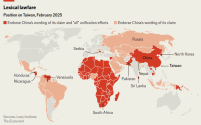You are making two fundamental mistakes with this line of reasoning.
Alright, time to reply to this.
First of all, you're making quite a few assumptions on what I know and what I think.
It is not in your place to make assumptions in such a fashion on things I have not publicly stated, and to make such judgements on "my misunderstandings".
Today all that has changed is that America has become more convinced that loosing to China means the start of its own destruction, since the whole domino middle steps are gone. Fight China and loose over Taiwan and American primacy is over.
All that means deterrence was never an option.
This is a massive proposition you’ve stated. I want to be clear: if deterrence is not an option, are you asserting that the U.S. will definitely go to war—or that the certainty of the U.S. going to war is overwhelmingly high—regardless of China's deterrence and actions? If you are not making such claim—that is, if there is a chance the U.S. will not go to war or escalate the conflict as you might be describing—then I fail to see why deterrence would not remain an option.
If it's the former case, then there needs to be far more support for this proposition. It's one thing for the PLA to be ready for total war with the US; it's an entirely different matter to assert the US will definitely escalate and go to war. I have some points, but I will wait for your comments first.
The second fundamental mistake is that you are shoehorning the current complex geopolitical picture on the irrelevant historical context of WWII and drawing all the wrong conclusions from it by basically re-imagining today’s world as a re-run of WWII, just with China cast in Japan’s place.
Furthermore, America forward deployed military assets are hardly decisive, which means even if China wipes them all out, it doesn’t fundamentally alter anything for America in terms of either it’s desire to fight China, or it’s ability to do so.
Setting aside your assumption about my understanding, the assumption that a first strike does not alter the U.S.'s desire to fight or its ability to wage
a war of attrition is not valid. I have already referred to the previous conversation with Rick on attrition, but overall it is very reductive, and establishing its certainty requires further proof.
Nonetheless, there is a chance that what you describe is true, yet it still does not negate my proposition. China might "win" with a deterrence strategy or with a first strike strategy, but the key point is that the
CCP will choose the method that minimizes risks and costs.
But eventually, no matter how careful China goes about it, it will reach a point where America feels it needs to move on China while it still can, and that tipping point will be well before China attains conventional military parity with America.
Such a perfect position will never be realistically attainable because China is not the only one who gets a vote on starting a war.
What you are describing is a war of necessity for China, while what I am describing is a war of choice. I did not exclude a first strike as a strategy in a war of necessity
Of course, a war of choice for China will not be "perfect". But more importantly, how do you think the U.S. would trigger such a war? Would it be by recognizing Taiwan as a country and forcing Taiwan to declare independence? Such actions come with significant costs. To quote a recent Foreign Affairs article:
"Many Asian allies worried that Washington’s actions provoked Beijing into cross-strait escalation, or at least handed Beijing a convenient justification for expanding its military activities around Taiwan."
"If U.S. allies and partners deem the United States responsible for the outbreak of a Chinese-Taiwanese war—even if inciting a conflict is not Washington’s intent—they will be less willing to assist U.S. resupply missions and less likely to view China as a threat to themselves. This perception would undermine the paramount U.S. objective of preventing Chinese hegemony in Asia."
Moreover, it is not certain that America's attempts will successfully trigger a war. China has cards to play against U.S. attempts.
All this is to say is that what you are saying is not a foregone conclusion, and it is not true that a war of choice—albeit imperfect—will never occur for China.
As an aside, this is why China's flexibility regarding its red line is a sound strategy. I would go so far as to say that very few factors would compel China to go to war
reactively, given its detrimental nature. The Anti-Secession Law is written in a sufficiently vague manner.
I think you are actually massively underestimating the scale, duration and length of the war, as well as the prize for the winner.
No lol



